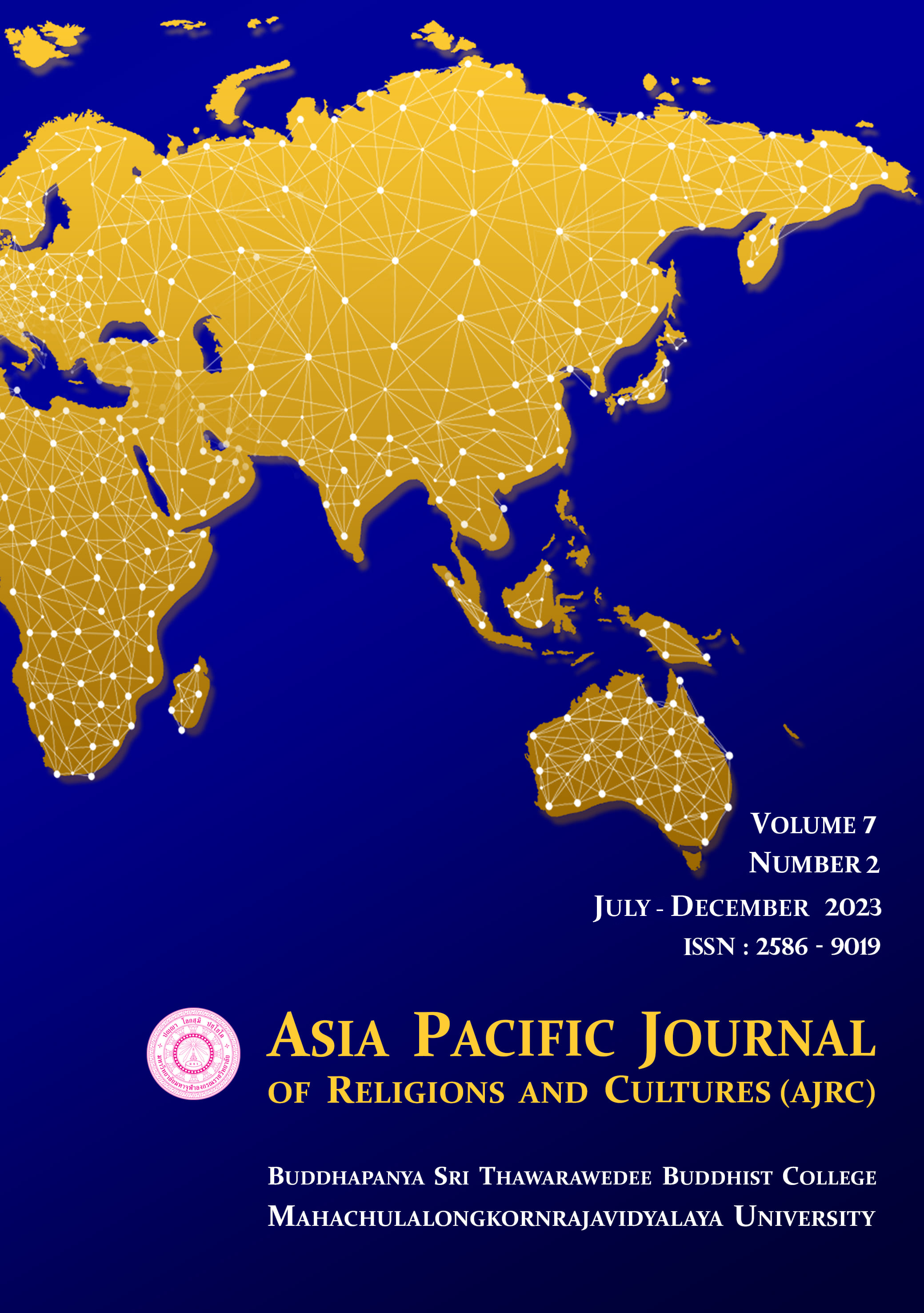TRANSFORMATIONAL LEADERSHIP OF SCHOOL ADMINISTRATORS AFFECTING SCHOOL MANAGEMENT IN DIGITAL ERA UNDER THE SECONDARY EDUCATIONAL SERVICE AREA OFFICE KANCHANABURI
Main Article Content
Abstract
The purposes of this research were to 1) identify the transformational leadership of school administrators under The Secondary Educational Service Area Office Kanchanaburi (SESAOK), 2) identify the school management in the digital era of school administrators under SESAOK, and 3) identify the transformational leadership affecting the school management in the digital era of school administrators under SESAOK. The research samples were 28 schools under The Secondary Educational Service Area Office Kanchanaburi. There were 8 respondents from each school including 1) a school director or an acting school director, 2) a deputy school director or an acting deputy school director, 3) two heads of departments, and 4) four teachers, with a total of 224. The research instrument was an opinionnaire concerning transformational leadership according to Leithwood, Jantzi, and Steinbach’s concept and school management in the digital era according to Lee and Gaffney’s concept. The statistics used for data analysis were frequency, percentage, arithmetic mean, standard deviation, and stepwise multiple regression analysis. The findings of this research were as follows:
1) The overall of transformational leadership of school administrators under SESAOK was at a high level. When considering each aspect, the average of all aspects was at a high level from the most to the least as follows: creating and maintaining shared decision-making structures and processes, creating high-performance expectations, culture building, building a shared vision, developing consensus about goals, modeling important values and practices, creating intellectual stimulation, and providing individualized support, respectively.
2) The overall of school management in the digital era of school administrators under SESAOK was at a high level. When considering each aspect, the average of all aspects was at a high level from the most to the least as follows: managing risk, shaping and selecting digital technology, managing information, achieving digital integration, overseeing the technology and education direction, securing school information assets, balancing internal and external control, managing enthusiasm, networking with the home technology, and financing the technology, respectively.
3) Transformational leadership of school administrators on creating and maintaining shared decision-making structures and processes, building a shared vision, creating high-performance expectations, providing individualized support, and developing consensus about goals affected school management in the digital era under SESAOK, as a whole, with statistical significance at the .05 level.
Article Details

This work is licensed under a Creative Commons Attribution-NonCommercial-NoDerivatives 4.0 International License.
References
Best, John W. (1970). Research in Education. Englewood Cliffs: Prentice-Hall
Inc.
Chaemchoy, Sukanya. (2018). School of Management in Digital Era.
Bangkok: Chulalongkorn University Press.
Jantzi, Doris, and Kenneth Leithwood. (1995) “Toward an Explanation of
How Teachers' Perceptions of Transformational School Leadership are Formed.” Paper presented at The Annual Meeting of the American Educational Research Association. San Francisco, CA, April 18-22, 1995.
Kimani, James. (2021). “Influence of Transformational Leadership Styles on
Performance-A Critical Literature Review.” International Journal of Leadership and Governance 1, 4 (2021).
Lee, Mal, and Michael Gaffney. (2008). “Leading schools in a digital era.” In
Leading a digital school. Edited by Mal Lee and Michael Gaffney. Camberwell Victoria: ACER Press.
Leithwood, Kenneth, Doris Jantzi, and Rosanne Steinbach. (1999). Changing
leadership for changing times. Buckingham: Open University Press.
Likert, Rensis (1961). New Pattern of Management. New York: McGraw-Hill,
office of the Education Council. Education in Thailand 2019-2021. Bangkok: Prigwhan Graphic.
Panhinkong, Jackkrapan, and Choochat Phuangsomjit (2019).
“Transformational leadership of school administrators affecting the being of learning organization in basic education schools under the Secondary Education Service Area Office 7.” Silpakorn University Journal 39, 5 September-October 2019.
Sirifak, Nongluk. (2019) “Transformational Leadership of Administrators
and Information and Communication Technology of Secondary School in Kanchanaburi.” Journal of Educational Administration and Leadership 10, 2 July–December 2019.
Sunarto, E. Handayani Tyas, and Lamhot Naibaho (2021). “Effective School
Management in Industrial Revolution Era 4.0.” In Proceeding of the 2nd Annual Conference on Blended Learning, Educational Technology and Innovation (ACBLETI 2020). Padang, Indonesia, October 23-24, 2020. Paris: Atlantis Press, 2021.
Sutarni, Nani, and others (2020). “Change Management of Education
Institutional in the Digital Era.” International Journal of Advanced
Science and Technology 29, 5 (2020).
The Secondary Educational Service Area Office 8. (2018) “Overall Operation
Report of Fiscal Year 2017.” Document number 4/25561, 2018.


